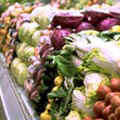|
by Elizabeth Sawin
11 Mar 2002
IThis missing information is vital, because a system that makes decisions based on a single variable can only fulfill a single goal. You wouldn't expect a healthy garden if you only optimized the phosphorous content of your soil. You wouldn't expect a healthy family if you made all choices based on the needs of only one of your two children.
And yet the reigning assumption in our world is that an economy that takes only price into account can still somehow deliver other goals. Under this assumption, if children are in poverty we must have a "child-poverty crisis." If ecosystems are struggling we must have an "environmental crisis." But these are not distinct problems. They are symptoms of a single deep crisis -- the crisis of an economy operating with insufficient information and a fundamental inability to pursue any goal beyond that of price.
Whether we are trying to help an estuary or an impoverished nation, we find ourselves struggling against the full force of an economic system that is designed to optimize the bottom line no matter what the consequences for people and nature. This isn't evil or malevolence. It is just a powerful, informationally bereft system in single-minded pursuit of its only goal.
Instead of exhausting ourselves pushing against such a system, perhaps it is time to redesign it.
Already we have ideas and technologies that we could borrow creatively. If Fed-Ex can track the exact location of any package anywhere in the world, why can't we know the history of a bunch of bananas? We can handle countless reviews of books and movies without clogging up the entertainment industry, so why can't we have reviews of the social and environmental impacts of wedges of cheese, bottles of wine, and bouquets of flowers? Why can't we estimate the true costs of products and make sure that cost shows up in the final price? Why can't we find ways to reward the efforts of careful stewards and responsible manufacturers?

Every veggie has a story.
People will call me naive for suggesting such ideas. People will say that it is impossible to consciously design a more intelligent economy.
In response I simply say that we won't know it is impossible until we try. And I ask you to count up all the people who have ever wanted to do the right thing and found it impossible. Impossible because the right thing for land or people doesn't have a sufficient return on investment to satisfy shareholders, because a responsibly produced product cannot be sold for a low enough price to be competitive, or because a consumer can't tell which product was made with the future in mind.
Like water held back by a dam, the frustration felt by these people trying to do the right thing represents power; once we see how the battles we are fighting are the product of the obsolete assumptions of our economic system, we will be able to access that power. That is when we will see the veterans of battles to save the whales working alongside the defenders of children, the developers of solar cells, the organizers of migrant laborers, and the business leader of the highest ideals.
The world has never known a coalition like that, but it is high time to find out what it could accomplish.
Elizabeth Sawin is a mother, biologist, and systems analyst. A member of Cobb Hill Cohousing, she lives on an organic farm in Hartland, Vt. She works at the Sustainability Institute, a think-do tank founded by Donella Meadows.
(2002.03.11)
http://www.gristmagazine.com/grist/citiz
en/citizen031102.asp
|
